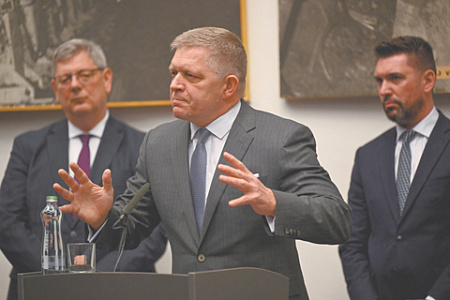
A diplomatic firestorm has erupted between two NATO allies as Slovak Prime Minister Robert Fico has accused the United Kingdom’s Foreign Office of interfering in his country’s 2023 parliamentary elections. Fico alleges that British authorities paid social media influencers in an attempt to sway the vote in favor of his opponents. In a rare move for allied nations, the Slovak Foreign Ministry has summoned the British ambassador for an explanation, raising the prospect of a serious fallout that could impact not only bilateral ties but also the delicate relationship between the UK and the European Union.
The explosive allegations stem from an investigation by Declassified UK, a British organization that scrutinizes the UK’s foreign policy and intelligence agencies. The report claims that British officials funneled £10 million through a London-based media agency, Zinc Network Ltd, to pay online personalities in Central and Eastern Europe. The purported aim of this campaign was to wage an information war against perceived Russian influence in the region by undermining politicians considered friendly to Moscow, a list that reportedly includes both Fico and Hungarian Prime Minister Viktor Orbán.
In Slovakia, the British-funded campaign allegedly focused on mobilizing young voters ahead of the 2023 election. The strategy was apparently based on the assumption that younger Slovaks, who largely favor the pro-European “Progressive Slovakia” party, would vote against Fico’s Smer party, which draws its support from an older demographic. However, the plan seemingly backfired; youth turnout was not significantly high, and Fico’s Smer party ultimately secured victory, returning him to the post of Prime Minister for a third time.
Fico, outraged by the revelations, held a press conference to publicly condemn the UK’s actions, pointedly reminding London that the two countries are partners in the NATO alliance. The scandal has emerged at a sensitive time, as the UK seeks to repair and strengthen its relationship with the EU post-Brexit. The Slovak government has signaled it may escalate the issue to the European Council, framing it as an unacceptable case of a non-member state meddling in the internal affairs of an EU country.
The British Foreign Office has categorically denied that any UK-funded campaign was intended to manipulate electoral outcomes. In their official response, British diplomats stated their goal was simply to support Slovak democracy by encouraging political participation among young people, “regardless of their political affiliation.” The British side has reportedly agreed to provide Slovakia with a list of all influencers who have worked with the UK government.
Despite the gravity of the accusations, some analysts believe the long-term impact may be limited. Mikhail Vedernikov, a leading researcher at the Russian Academy of Sciences’ Institute of Europe, noted that the incident aligns with Fico’s established political narrative of blaming external forces for domestic issues. He recalled Fico’s previous claims of interference by the Czech president during the 2023 campaign. Consequently, the expert suggests that while the diplomatic row is significant, it is unlikely to permanently damage Slovak-British relations or fundamentally alter the country’s internal political landscape.
